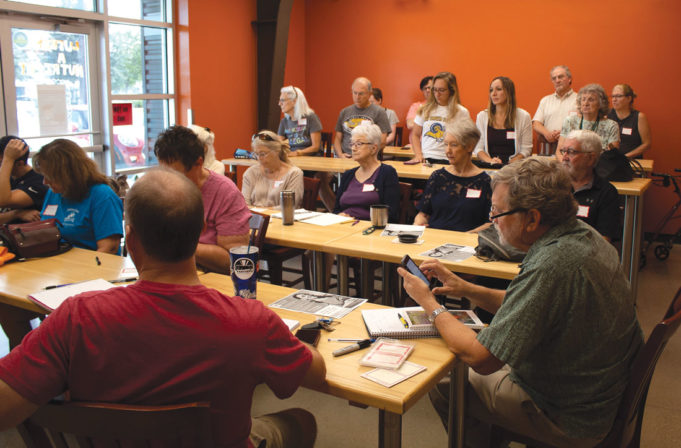Around 20 teenagers, college students, and adults recently met at Natural Grocers near the West 7th area to plan for Global Climate Strike (September 20-28), an international week of action against climate change. Environmentally minded activists have been gathering at city centers around the world since 2008, and now Fort Worth will be joining them. Among the attendees at the recent meeting was 10th-grader Libby Connolly.
The Pascal High School student who recently moved to Fort Worth from Wisconsin describes herself as “politically engaged.” An online search for Fort Worth participants in the Global Climate Strike brought her to the grassroots meeting.
She said that she and her friends “are concerned about what is going on” environmentally.
In many ways, Connolly is taking proactive steps to solve a problem that her generation did not cause. Decades of emissions from the burning of fossil fuels have set Earth’s climate toward a warmer and more volatile future, according to global scientific community consensus. Connolly’s reasoning for volunteering is simple.
She and her friends, she said, “want to grow old and to have kids. We have a lot at stake.”
The meeting, partly led by John MacFarlane, chair of the Greater Fort Worth Sierra Club, touched on potential outreach efforts to grow awareness of the strike, social media coordination, and sign-making tips. The efforts will culminate on Friday, September 20, just outside of Fort Worth City Hall (200 Texas St.). Strikers are encouraged to arrive anytime between 9 a.m. and 4 p.m. The peaceful event will include a march around City Hall every hour on the hour, MacFarlane said. Interested participants can find the Facebook event page by searching: “climate strike – fort worth.”
MacFarlane said that the “time was right” for Fort Worth to engage public officials on the often politically charged topic of climate change. Periodic reports from the United Nations and fears of coastal flooding can make climate change appear to be some far-off problem that will never really affect Fort Worth or our region, he said.
Not so, says Michael Slattery, TCU professor and director of the Institute for Environmental Studies. The scholar and environmental scientist has served on the university’s faculty for more than 20 years. In that time, he has seen the campus and Fort Worth as a whole make important strides toward sustainability. The sprawling campus now uses state-of-the-art insulation, and any new buildings must meet rigorous environmental guidelines, he said.
“In recent years, Fort Worth has added bike-sharing programs, and city buses run on natural gas,” he said. “I wouldn’t give our city a failing grade, but we need leaders who have the vision to say that there is money to be made in an environmentally cleaner future.”
Oil and gas companies are easy targets for ire, he added, but we are all partly to blame for climate change.
“I should be cycling to work,” he said. “I drive a car and fill it up with this ‘magical stuff.’ It’s tough, especially in these southern cities that do not have public transport.”
Often, the documentaries and narratives that surround climate change involve breaking glaciers and stranded polar bears. Those heartstring images deflect from the realities of how climate change is currently impacting weather and agriculture inside the Lone Star State.
“The idea of climate change seems too far off in the future” for many people, Slattery said. “Sea level rise will not impact us, but other things will. The data, everything points toward an increasingly warmer world. Texas will be at the forefront of that. We are a state that is prone to extremes. We have extreme hots and colds, flooding, and droughts. Climate change will be a multiplier of that.”
The scientific community predicts a global rise in average annual temperatures of two to four degrees, and that’s on the conservative side. Slattery said climate models are forecasting more extreme weather events, lower precipitation, longer droughts, and a drier, hotter Texas. All of those factors will lead to less water for natural gas fracking, lower aquifers, and increased problems for the cattle industry.
While climate change remains a political hot potato, Slattery has found that many in the private business community are open to learning about the challenges climate change will bring. Indeed, multinational companies like ExxonMobile, which once funded dubious climate research, are now supporters of the Paris Climate Agreement. It’s hard to know what PR maneuvering goes on in those corporate board room meetings, Slattery said, but most companies now understand that the science is clear and climate change can mean huge profits or losses depending on how companies position themselves and their resources now.
If nothing else, Slattery hopes that the September Global Climate Strike spurs individuals to take small steps to reduce their carbon footprint. Carpooling and driving less are important, he said, but many important environmental decisions happen in the grocery store or when shopping online.
“Organic doesn’t mean it’s locally grown,” he said. “Buying local is critical.”
One sign of hope is the strong interest college students are showing in sustainability, he added. Many TCU courses incorporate sustainability into the curriculum. The changes are largely student-driven.
“The older generation has done a good job of messing things up,” Slattery said, “and these students want something different for their future.”













Great story. Keeping an open mind and bringing awareness without judgement is critical to changing minds. Even small changes in lifestyle and behaviors can have an impact if a lot of people make those changes
@HowieHawkins20 @H’20 peace through green jobs
How do these activists square their positions with the recent report from the NOAA that they hasn’t e’en any change to temperatures since 2005?